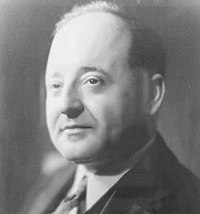Louis Wirth
| Louis Wirth | |
|---|---|

Louis Wirth
(August 28, 1897 – May 3, 1952) |
|
| Born |
August 28, 1897 Gemünden, Rhine Province, Prussia |
| Died | May 3, 1952 (aged 54) |
| Nationality | American |
| Fields | Sociology |
| Alma mater | University of Chicago |
| Academic advisors |
Robert E. Park Ernest Burgess W. I. Thomas Albion W. Small |
Louis Wirth (August 28, 1897 – May 3, 1952) was an American sociologist and member of the Chicago school of sociology.
Louis Wirth was born in the small village of Gemünden in the Hunsrück, Germany. He was one of seven children born to Rosalie Lorig (1868-1948, from Butzweiler/Eifel) and Joseph Wirth. Gemünden was a pastoral community, and Joseph Wirth earned a living as a cattle dealer. The family was Jewish and both of his parents were religiously active. Louis left Gemünden to live with his older sister at his uncle's home in Omaha, Nebraska in 1911. Soon after arriving in the United States, Louis met and married Mary Bolton. The couple had two daughters, Elizabeth (Marvick) and Alice (Gray).
Wirth studied in the United States and became a leading figure in Chicago School Sociology. His interests included city life, minority group behaviour and mass media and he is recognised as one of the leading urban sociologists. Wirth's major contribution to social theory of urban space was a classic essay Urbanism as a Way of Life, published in the American Journal of Sociology in 1938.
His research was mostly concerned with how Jewish immigrants adjusted to life in urban America, as well as the distinct social processes of city life. Wirth was a supporter of applied sociology, and believed in taking the knowledge offered by his discipline and using it to solve real social problems.
Wirth writes that urbanism is a form of social organisation that is harmful to culture, and describes the city as a “Substitution of secondary for primary contacts, the weakening of bonds of kinship, the declining social significance of the family, the disappearance of neighbourhood and the undermining of traditional basis of social solidarity”. Wirth was concerned with the effects of the city upon family unity, and he believed urbanization leads to a ‘low and declining urban reproduction rates … families are smaller and more frequently without children than in the country’. According to Wirth, marriage tends to be postponed, and the proportion of single people is growing, leading to isolation and less interaction.
...
Wikipedia
